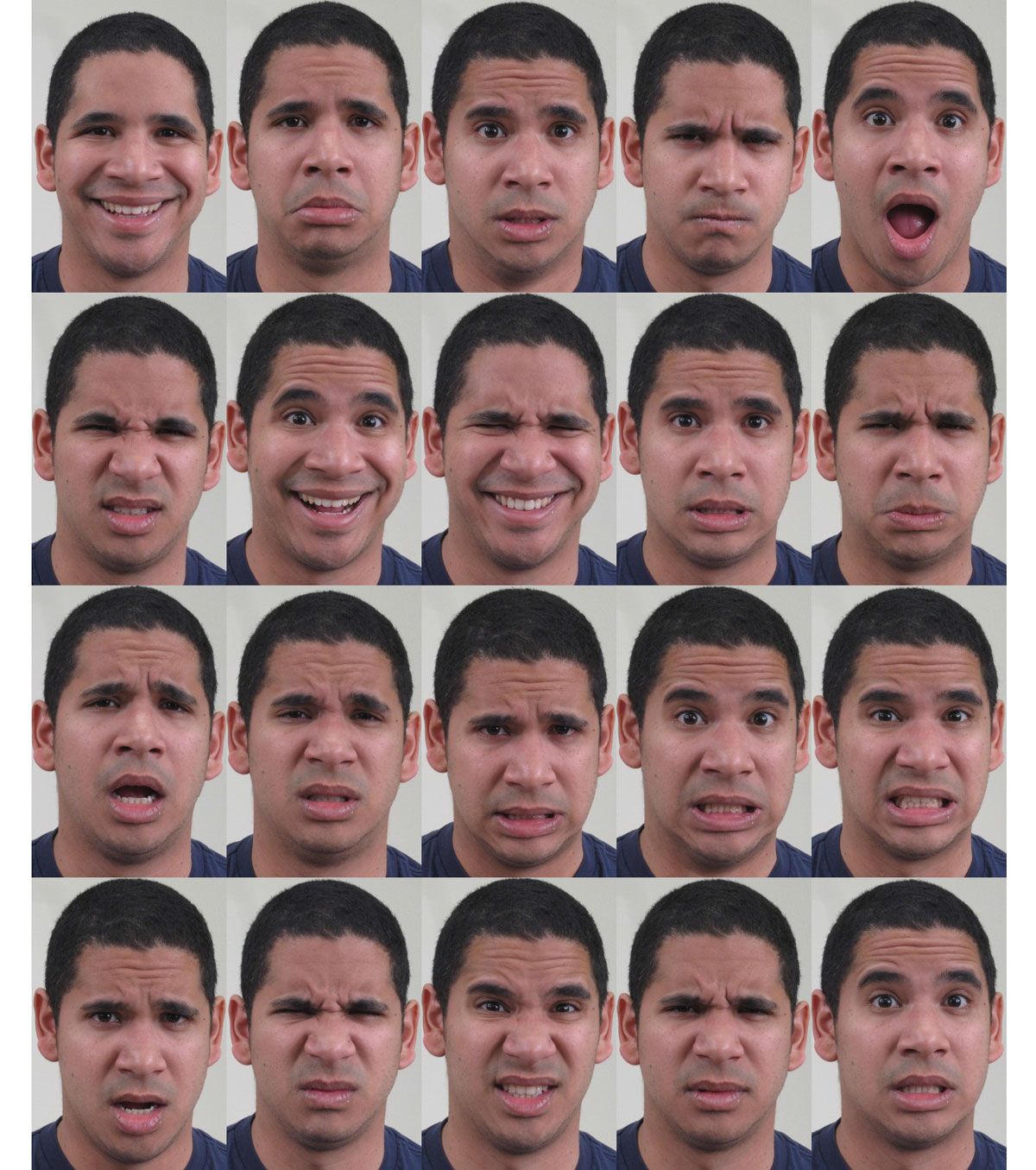This is one of a series of discussion posts based on questions from the AQ-10 autism test.
7. I find it easy to work out what someone is thinking or feeling just by looking at their face.
- Definitely Agree
- Slightly Agree
- Slightly Disagree
- Definitely Disagree
Is this statement true for you? Can you think of any examples? Is it an easy or difficult question for you to answer?
You can take the full AQ-10 test here. Note this test is intended as a quick screener, and cannot diagnose or rule out any condition on its own.
Haha. I have opinions on this one. I think I’ll wait a bit before discussing it so as not to bias anyone else’s response.
(Later)

Look at all those emotions! Can you name them all? These pictures are used in emotional intelligence tests where they’ll ask you to do exactly that - name them all.
What they won’t ask you is, how is the photoshoot going for this guy? Is it his normal line of work and how does this particular job compare to a regular day? Are any of the faces difficult for him to make? Is he trying to method act them, does he have some rehearsed, does he have his own reference pictures to look at? Does he have a rapport with the photographer? Is the lighting bothering him? Is he tired? Does the shoot have catering? What’s he planning on doing later?
They don’t ask any of that because, obviously, you can’t tell what someone is thinking or feeling just by looking at their face.
Now, if you could see the context, if you knew something about the guy, could see how he was acting and what he was saying, then you could make a guess at some of this information. Maybe even a good guess. But just from the face alone? No chance!
Here is what emotional intelligence practitioners don’t want you to know about faces;
Facial expressions are live action emoji, that you act out with your face to communicate the idea of an emotion. They are not windows into the soul.
This question is garbage. Definitely Disagree
I routinely have to tell people to be more blunt with me; it seems like I’m always getting in trouble or yelled at or whatever for not picking up on their apparently obvious hints. No, fam, you have to use your words… just like you taught me when I was a kid.
See… I don’t know. I’ve been repeatedly told by academics and the like that I can’t, and also that “normal” people have this magical “mind-reading” ability. But I’m not sure how true that actually is. I’ve certainly never felt that I’ve misread someone’s face, although I’m not sure how I could tell. I certainly feel like I could look at someone’s face and feel the same emotions they are.
I just did one of those online tests about reading faces (specifically “emotional intelligence”, blegh) and apparently got slightly above average? But the faces were extremely exaggerated, not animated, presented without context and rather opinionated (this face is feeling XYZ because their facial muscles are doing ABC).
Maybe I rely more on context cues and empathy than actual reading of someone’s face? No idea.
Edit: I do agree with the sentiment about bluntness though. I can be very oblivious.
Ohoh my own updated response is very dismissive of those emotional intelligence tests, and the notion that normal people can read your mind through your face. I very much enjoyed Ponderful’s (very long) video on the subject, and you might too.
Strong disagree
I’m not too bad at reading emotion on people’s faces in photos/videos, but I don’t spend a lot of time looking at people’s faces when I talk to them in person. I’m aware that things like microexpressions exist, but you need to be watching a person’s face to catch them. I wonder why I’ve never seen this consideration discussed in relation to autism.
“Hey, are you not looking at people’s faces when you talk to them? Is your attention split by thinking about the correct amount of eye contact that you should be making? You might be missing a bunch of subtle information that is expressed through facial expressions during conversations!” Groundbreaking research!!
I don’t think I like this question. Especially the inclusion of knowing what someone is thinking. Knowing what someone is thinking would require an awful lot of context and familiarity with a person to the extent that everyone should be answering no.




